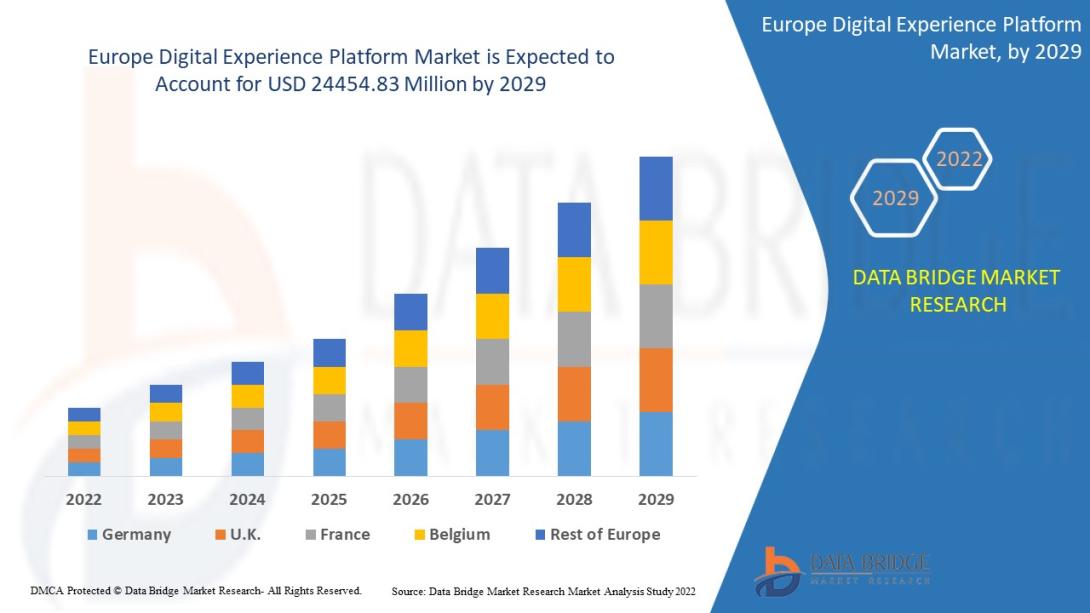
Introduction to Digital Experience Platforms (DXPs)
A Digital Experience Platform (DXP) is a unified software framework designed to manage, deliver, and optimize personalized digital interactions across multiple touchpoints. These platforms combine content management, customer data, AI-driven personalization, and analytics to enhance user engagement across websites, apps, email, and more.
As businesses in Europe evolve into digital-first organizations, DXPs are replacing outdated CMS and CRM systems to provide seamless, omnichannel experiences—from retail to healthcare, BFSI to government services.
Market Overview
The Europe Digital Experience Platform market is currently valued at USD 6.7 billion in 2024 and is projected to grow to USD 13.1 billion by 2030, at a CAGR of 11.9%. This surge reflects the accelerating digital transformation efforts across both the private and public sectors, with enterprises seeking customer-centric, scalable digital ecosystems.
Western European countries like Germany, France, and the UK dominate the market, while Southern and Eastern Europe are seeing rising adoption among mid-sized businesses and governments digitizing their operations.
Key Market Drivers
1. Omnichannel Engagement Demand
Modern consumers expect fluid experiences across mobile, desktop, in-store, and customer support channels. DXPs help centralize and orchestrate these interactions in real-time.
2. Investment in Digital Transformation
Businesses across Europe are undergoing aggressive digital overhauls, especially post-COVID. DXPs enable this by providing a centralized, data-driven engagement layer.
3. AI & Personalization
AI algorithms within DXPs analyze behavior, segment audiences, and serve hyper-personalized content, boosting customer satisfaction and conversions.
4. GDPR & Data Control
With Europe's strong privacy regulations, DXPs offer built-in consent management, data localization, and secure customer profiling—making them attractive to compliance-conscious firms.
Market Restraints and Challenges
- Integration Complexity: Merging DXPs with legacy systems like ERPs and CRMs can be costly and time-consuming.
- High Initial Costs: Full-featured DXPs can cost millions, especially for enterprises with complex customer journeys.
- Skills Gap: Many companies lack in-house expertise in CX design, data orchestration, and platform management.
- Data Fragmentation: Siloed data across departments can hinder a DXP’s ability to deliver unified customer views.
Market Segmentation
By Component:
- Platforms: Core DXP software with integrated CMS, AI, analytics
- Services: Implementation, consulting, and support
By Deployment:
- On-Premises: Still used in finance and government
- Cloud-Based: Preferred for scalability and SaaS integration
- Hybrid: Offers flexibility and regulatory compliance
By End-User Industry:
- BFSI
- Retail & E-Commerce
- Healthcare
- Government
- Education
- Manufacturing
By Application:
- Content & Asset Management
- Customer Journey Orchestration
- Personalization Engines
- Campaign Automation
- Analytics & Optimization
Key Technologies Empowering DXPs
- Artificial Intelligence: Dynamic personalization, behavioral targeting
- Machine Learning: Predictive analytics, content recommendation
- APIs & Headless CMS: Enable decoupled content delivery across channels
- Cloud & SaaS Platforms: Ensure availability, scalability, and remote access
- Customer Data Platforms (CDPs): Unify user data for real-time segmentation
Regional Insights Within Europe
Western Europe (Germany, UK, France)
The region leads in DXP innovation and spending. Enterprise-grade DXPs like Adobe Experience Cloud, Salesforce Experience, and SAP CX dominate.
Northern Europe (Nordics, Netherlands)
High digital literacy and early tech adoption fuel demand for modular, composable platforms.
Southern & Eastern Europe
Countries like Spain, Italy, Poland, and Romania are seeing DXP uptake among mid-market firms, telcos, and local governments launching citizen portals and digital storefronts.
Leading DXP Providers in Europe
- Adobe: Experience Manager, CDP, and personalization tools
- Salesforce: Experience Cloud, CRM-native DXP
- SAP: Customer Experience Suite with integration to ERP
- Sitecore: Leading headless and content personalization platform
- Acquia (Drupal): Open-source CMS turned DXP
- Liferay: Portal-based DXP for enterprise and government
- Kentico, Magnolia: Flexible mid-market solutions with growing traction
Open-source players like eZ Platform and Bloomreach are also gaining ground for their customization and cost efficiency.
Use Cases Across Industries
Retail & E-Commerce
- Personalizing product recommendations
- Managing multi-storefront content
- Automating loyalty and marketing workflows
BFSI
- Secure, seamless digital onboarding
- Personalized offers and self-service banking
- AI-powered chatbot support
Healthcare
- Digital patient portals
- Appointment scheduling and records access
- Health content personalization
Government & Education
- Digital citizen service portals
- E-learning content orchestration
- Language localization and accessibility
Regulatory Framework and Data Privacy
Europe leads globally in digital privacy regulations:
- GDPR: DXPs must include robust consent management, data portability, and security protocols.
- Data Sovereignty Laws: Some countries require data hosting within national borders—favoring cloud providers with local data centers.
- ISO/EN Certifications: Necessary for platforms in healthcare, defense, and financial sectors.
Future Outlook and Emerging Trends
- Composable DXP Architecture: Businesses are moving from monolithic to modular platforms, integrating best-of-breed tools via APIs.
- DXP-as-a-Service: SaaS delivery of DXPs with rapid setup and lower cost of ownership.
- Predictive UX: Using AI to predict user behavior and pre-load content or offers.
- Green DXPs: Monitoring and reducing the digital carbon footprint of content delivery and user engagement.
Smart city initiatives and public digitization in transport, health, and education also offer long-term opportunities.
SWOT Analysis
Strengths:
- Enables omnichannel, personalized experiences
- Supports data compliance and secure engagement
- Flexible deployment across industries
Weaknesses:
- High learning curve and cost
- Integration challenges with legacy systems
Opportunities:
- Mid-market expansion in Eastern/Southern Europe
- Composable and open-source platform growth
- AI-powered hyper-personalization
Threats:
- Data regulation tightening
- Competition from niche martech tools and CDPs
Conclusion
The Europe Digital Experience Platform market is a cornerstone of modern customer engagement strategies. As brands and institutions seek to deliver seamless, secure, and personalized interactions, DXPs are enabling them to centralize content, unify data, and drive customer loyalty.
The future of digital transformation in Europe is rooted in composable, intelligent, and privacy-compliant platforms—and DXPs are at the heart of that evolution.
Get More Details : https://www.databridgemarketresearch.com/request-a-sample/?dbmr=europe-digital-experience-platform-market
Get More Reports :
https://www.databridgemarketresearch.com/reports/global-tight-gas-market
https://www.databridgemarketresearch.com/reports/global-milk-protein-hydrolysate-market
https://www.databridgemarketresearch.com/reports/global-ip-vpn-web-hosting-service-market
https://www.databridgemarketresearch.com/reports/global-video-streaming-software-market
https://www.databridgemarketresearch.com/reports/europe-iron-ore-pellets-market

